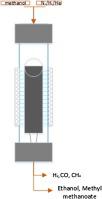Chemical Engineering and Processing: Process Intensification ( IF 3.8 ) Pub Date : 2020-06-09 , DOI: 10.1016/j.cep.2020.107985 Jonathan Harris , Kui Zhang , Anh N. Phan

|
The feasibility of oxygen removal from alcohols using cold plasma technologies at atmospheric pressure and low temperatures was studied experimentally and numerically. Methanol was used as a model compound to understand the effect of highly energetic electrons and the carrier gas on deoxygenation and to establish the reaction pathways. The results will provide insight into upgrading bio-oil derived from lignocellulosic pyrolysis, waste glycerol from biodiesel production processes and waste cooking oils.
Under cold plasma at atmospheric conditions, the reaction mechanism is via radicals while the protective effects of the liquid-gas interface allows accumulation of products not otherwise feasible without specialised catalysts. The product distribution can be extensively tuned by changing the carrier gas and/or plasma power. Hydrogen favours longer chain hydrocarbons and helium generates liquid phase products including propanal, methyl methanoate and formic acid while nitrogen produces more carbon dioxide and water. Process yields and tunability could potentially be improved further by using simple catalysts or dielectric packing materials.
中文翻译:

冷等离子体辅助的醇分解
实验和数值研究了使用冷等离子体技术在大气压和低温条件下从醇中除氧的可行性。甲醇用作模型化合物,以了解高能电子和载气对脱氧的影响并建立反应路径。研究结果将为深入了解木质纤维素热解衍生的生物油,生物柴油生产过程中的废甘油和废烹饪油提供见识。
在大气条件下的冷等离子体下,反应机理是通过自由基进行的,而液-气界面的保护作用使积聚的产物在没有专门的催化剂的情况下不可行。通过改变载气和/或等离子功率,可以广泛地调节产品分布。氢有利于较长链的碳氢化合物,氦会生成液相产物,包括丙醛,甲烷酸甲酯和甲酸,而氮会生成更多的二氧化碳和水。通过使用简单的催化剂或介电填料,可以潜在地进一步提高工艺产量和可调性。











































 京公网安备 11010802027423号
京公网安备 11010802027423号